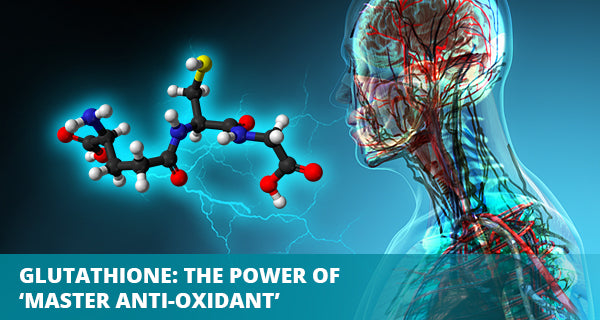Glutathione: The Power of ‘master anti-oxidant’ (SQ-61)
Glutathione is your body’s most powerful antioxidant and detoxifying substance. But not many people are aware of its role, which is unfortunate as glutathione deficiency is known to hasten the ageing process and increase your risk of degenerative diseases like dementia, heart disease, arthritis, cancer, lung disease, Alzheimer’s and more. [1-3]
Glutathione is a simple molecule made up of three amino acids cysteine, glycine and glutamine. Your body naturally produces this protective molecule but in the taxing, stressful environment we are living in today, this may not be enough.
Chronic stress and exposure to toxins (chemicals, heavy metals and radiations) easily drain this super antioxidant from your body. If you are heavy drinker, suffer from a chronic infection or illness, smoke a lot and use prescription drugs or over the counter medicines in excess, your body loses more glutathione. In addition, the amount of glutathione that your body makes declines with age.
Sadly, we all have to deal with these situations almost on a daily basis, which kind of explains why the health of humans, in general, is such a mess today. All this toxic exposure increases the generation of free radicals, highly reactive molecules with an unpaired electron that provokes them to steal electrons from lipids, proteins, mitochondria and DNA.
This process, called oxidation, modifies the structure as well as functions of these cellular entities, triggering immune and inflammatory reactions – making the body prone to chronic inflammation, premature ageing, infections and disease. At this stage, you certainly need more antioxidant defence.
Why is glutathione called a ‘master antioxidant’?
Like most other antioxidants, glutathione supplies an extra electron to free radicals that are on an electron snatching spree; cooling them off and rendering them harmless. By neutralizing these molecules, glutathione supresses a cascade of immune reactions that may otherwise lead to systemic inflammation. This is why glutathione is known to be immensely helpful in preventing all sorts of inflammation-led diseases such as cancer, cardiovascular disease and neurogenerative disease.
While it works as other antioxidants in protecting cells, DNA and tissues from the oxidative damage, glutathione still differs from any other breed of antioxidants that you know. Why?
Glutathione is an endogenous antioxidant, which means it is produced internally and is present within the cells, unlike vitamin C (found in the bloodstream) and vitamin E (present in the cell membranes). It is positioned at the right spot to protect the cells and their mitochondria from oxidative damage.
This super antioxidant can regenerate itself after it is done cooling off free radicals and go back to work. And it also helps recycle other antioxidants in the body such as vitamin C and vitamin E. (Did you know good, healthy sleep increases your glutathione levels? Melatonin, a hormone that your body produces when you sleep and regulates sleep-wake cycles, increases glutathione levels in tissues such as the liver, brain and muscles).
Glutathione also cleans up the toxic metabolic waste – free radicals and reactive oxygen species – released during immune responses, thus protecting the immune cells from oxidative damage. In addition, it is a master detox molecule (critical in eliminating toxins from the body) and also regulates the immune system by triggering T cells into action. [4-5] All this explains why your body uses more glutathione when it is under any kind of stress or dealing with an infection or illness. It eliminates free radicals and fires up immune functions to destroy pathogens.
While ageing, toxins and stress take a severe toll on glutathione levels in the body, the good news is you can reverse the deficiency. A high quality liposomal glutathione supplement may help you improve your levels and give you effective protection against disease, infection and early ageing.
References:
- N Ballatori et al. Glutathione dysregulation and the etiology and progression of human diseases. Biol Chem. 2009 Mar; 390(3): 191–214.
- Chava B. Pocernich. D. Allan Butterfield. Elevation of glutathione as a therapeutic strategy in Alzheimer disease. 2012. Biochimica et Biophysica Acta (BBA) - Molecular Basis of Disease
- Townsend DM, Tew KD, Tapiero H. The importance of glutathione in human disease. Biomed Pharmacother. 2003 May-Jun;57(3-4):145-55.
- T W Mak et al. Glutathione Primes T Cell Metabolism for Inflammation. Immunity. April 2017.
- Allen et al. Mechanisms of Control of Mycobacterium tuberculosis by NK Cells: Role of Glutathione. Front Immunol. 2015
Disclaimer
Information on our websites, in our blogs and our emails are provided for informational purposes only, and have not been evaluated by the EMA, EFSA or FDA. It is not meant to substitute medical advice provided by your healthcare professional and is not intended to diagnose, treat, cure, or prevent any disease. Our products are intended for adults, 18 years of age and older. While the vitamins and supplements mentioned here have been shown to have various health benefits, it is important to remember that supplements and dietary changes should be considered as part of an overall health plan and not as a substitute for professional medical treatment. Only a qualified healthcare practitioner can provide personalized advice and treatment plans based on your individual health needs and medical history, and you should seek advice from your healthcare professional before taking product(s) if you are pregnant or nursing.


